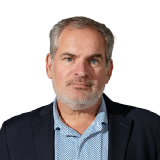
[ad_1]
The NCAA’s chief medical officer and its two primary infectious disease advisers say the nation’s focus should be on controlling the coronavirus pandemic instead of playing fall sports, with one adviser saying “we simply are not there now.”
Carlos del Rio, executive associate dean at Emory University and a fellow with the Infectious Diseases Society of America, said in a video conference Thursday that many communities — including the state of Georgia, where he works — have COVID-19 case levels that surpass what he believes to allow for a safe return to athletic competition.
“I feel like the Titanic. We have hit the iceberg, and we’re trying to make decisions of what time should we have the band play,” said Del Rio, who serves on an NCAA COVID-19 advisory panel. “We need to focus on what’s important. What’s important right now is we need to control this virus. Not having fall sports this year, in controlling this virus, would be to me, the No. 1 priority.”
NCAA Chief Medical Officer Dr. Brian Hainline said 1-2% of athletes at NCAA schools who have been tested have tested positive for COVID-19. Of those, he said he knows of a dozen cases of a viral-triggered heart condition called myocarditis, which can pose a risk for sudden cardiac arrest and death.
Conference officials and athletic directors told ESPN that the uncertainty about the long-term effects of myocarditis has been discussed in meetings of presidents and chancellors, commissioners and athletic directors, and health advisory board members from the Big Ten, Pac-12 and other conferences around the country.
Thursday’s video conference followed decisions this week by the Pac-12 and Big Ten to postpone fall sports, with the ACC, SEC and Big 12 planning to go ahead with play.
Emory infectious disease assistant professor Dr. Colleen Kraft, also a member of the advisory panel, said she appreciated conferences that have decided to hold off “because that keeps the safety of athletes as the No. 1 priority.” She said of those planning to play fall sports, “There will be transmissions [of COVID-19], and they will have to stop their games.”
In a separate video conference Thursday, Dr. Jonathan Kim, a sports cardiologist at Emory University, a team cardiologist at Georgia Tech and a member of the ACC Sports/Exercise Council, said various studies have suggested that about 20% of hospitalized COVID-19 patients have suffered some sort of cardiac injury, including myocarditis. Kim said data isn’t available to determine how prevalent the condition is in athletes who have contracted the coronavirus.
In May, Kim and other cardiologists issued return-to-play recommendations for athletes coming back from myocarditis, including three to six months of reduced exercise.
“When we diagnose myocarditis in athletes, what we recommend is a minimum of three months of no high-end physical training,” Kim said. “The recommendation is rest, at a minimum of three months up to six months. At that time, based on the clinical presentation, the athlete would undergo a series of repeat testing, which would include imaging, exercise testing, monitoring looking at heart rhythm and potentially other tests. If all of those tests are normal, then the athlete would be allowed back to return to play.”
Kim said there are still questions on how much myocarditis is a consequence of COVID-19.
“For all intents and purposes as it relates to athletes and return to play, when we do see evidence of cardiac injury, we are treating it as if it’s underlying myocarditis,” Kim said. “I think where we are at present, based off of some of these case reports that are out there, I do think it affirms the need to continue to take this virus very seriously and proceed with a more conservative risk-stratification algorithm.”
“We recognize this is a novel virus. There are things about this virus we have not seen before with other viruses. We must respect what we don’t know and what we’ve seen. I do think that just with some of these reports of athletes who have publicly noted that they’ve had myocarditis, it affirms the need that a conservative approach for now still remains an appropriate plan.”
In addressing concerns about myocarditis, Kraft said, “We are playing with fire.”
“I think one case of myocarditis in an athlete is too many,” she said.
Hainline said the NCAA recently made its COVID-19 recommendations for schools mandatory and on Wednesday set up a phone hotline and email that anyone can call to report concerns that schools aren’t following those rules.
He also discussed the debate over whether practicing with a football team was more or less safe than just being a student on campus. He said that it depends on the school, as some have taken more precautions than others. While he pointed to some positive innovations in face coverings for football players, Hainline said the greatest risk is when you get two teams together when one might have been taking better precautions than the other.
“I feel like the Titanic. We have hit the iceberg, and we’re trying to make decisions of what time should we have the band play. We need to focus on what’s important. What’s important right now is we need to control this virus. Not having fall sports this year, in controlling this virus, would be to me, the No. 1 priority.”
Carlos del Rio, who serves on an NCAA COVID-19 advisory panel
Hainline said he and his advisers did not expect in March, when the NCAA decided to cancel the remaining winter and spring sports for that season, that the situation would be so much worse in the fall.
“Our population has been preventing us from going back to collegiate [athletics],” Kraft said, “because people don’t want to do the basic hygiene things that prevent transmission.”
Asked what would be different going into the spring, Hainline said he hoped there would be more rapid testing and possibly a vaccine.
“It’s going to be where are we as a country and where are we as humanity in making decisions for one another so that we get through this pandemic together,” he said. “So it’s not just about football in the spring. It’s, more importantly, it’s where are we as human beings taking care of one another. And I don’t know where we’ll be in the spring, but where we are today, it’s exceptionally disappointing.”
[ad_2]
Source link

